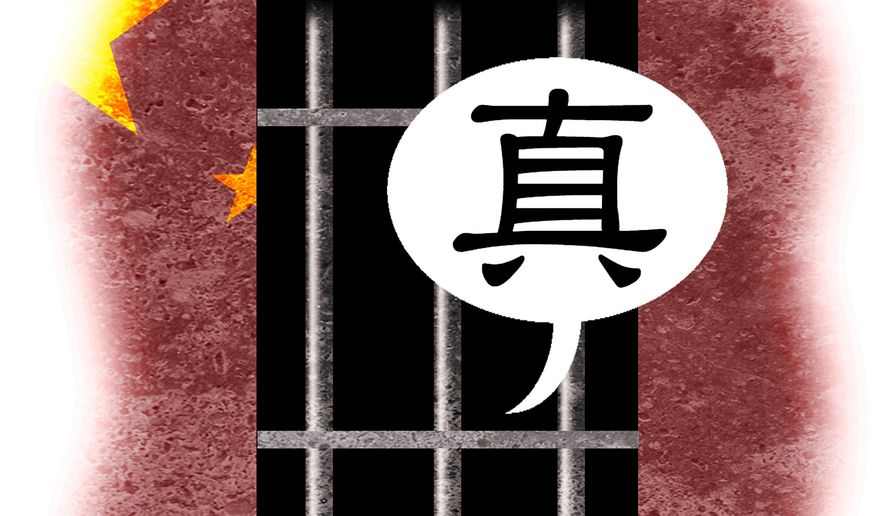OPINION:
Hong Kong businessman and political dissident Jimmy Lai told me over dinner at his Taiwan home in 2019 that he knew speaking out for truth, justice and freedom in the region could come at great personal cost. He is now behind bars for this supposed crime, so I’m speaking out for him.
On Dec. 10, Jimmy, the founder of Apple Daily — the pro-democracy newspaper that so threatened the Chinese government that it shut it down last year — was sentenced to five years and nine months for two counts of fraud over an alleged breach of a lease for Apple Daily’s former headquarters.
He was already imprisoned for more than a year and a half on different trumped-up charges. And the 75-year-old still faces up to life in prison under the national security law China imposed on Hong Kong in June 2020 to stifle any opposition to its authoritarian rule.
His trial for alleged collusion with foreign forces and conspiracy to publish and distribute seditious material was set to take place on Dec. 1. That has now been pushed to September 2023 because the Hong Kong government has repeatedly fought to bar Jimmy from being represented by his British lawyer, King’s Counsel Timothy Owen.
All the while, the United Kingdom’s top brass has remained eerily mum. That’s disturbingly surprising because Jimmy is a British citizen.
Before becoming prime minister, Rishi Sunak campaigned on standing up to Beijing, calling China the biggest long-term threat to Britain. Now that he’s in power, he’s taking a slightly weaker tack, calling it a “challenge.”
“My view on China is straightforward. I think that China unequivocally poses a systemic threat — well, a systemic challenge — to our values and our interests, and is undoubtedly the biggest state-based threat to our economic security, let me put it that way. That’s how I think about China,” he said.
But now Beijing has gone for the personal security of one of Britain’s very own.
Here’s the thing: With his British passport and resources, the brave newspaper magnate could have easily fled Hong Kong. Instead, he chose to stay — he’s rebellious at heart, he’s often said.
But Jimmy isn’t the only Hong Konger who faces unlawful detention: Since the implementation of Beijing’s broad and intentionally vague national security law, there have been roughly 200 arrests. For simple things, like showing up at peaceful democracy protests or prayer vigils, as Jimmy did. For wanting to live in a democracy.
The Hong Kong Free Press broke it down this way: A person has been arrested under the law every 3.7 days.
Earlier this year, the United Nations Human Rights Committee urged the repealing of the law, raising deep concerns about the “arbitrary application” of the legislation. The law, in essence, is designed to allow China to punish anyone it’s decided has “threatened” national security — read the Chinese Communist Party’s (CCP) power — in any way, shape, or form.
Last month, Mr. Sunak said that the so-called golden era of Chinese-British relations is no more.
In fact, that ended when the CCP broke the 1997 Sino-British Joint Declaration — the binding agreement in which Britain handed its former colony over to China in exchange for promises that Beijing would leave intact the rights of Hong Kongers.
So bad is the decline of law and order in Hong Kong that foreign judges — the ones tasked with protecting judicial independence — are resigning in protest.
In April, Lord Robert Reed and Lord Patrick Hodge, the U.K.’s Supreme Court president and deputy president, stepped down from their roles on Hong Kong’s top court. They couldn’t “continue to sit in Hong Kong without appearing to endorse an administration which has departed from values of political freedom and freedom of expression.”
China, of course, responded. Carrie Lam — at the time Hong Kong’s Beijing-backed chief executive — “vehemently” rebutted “any unfounded allegations that the judges’ resignations have anything to do with the introduction of the Hong Kong National Security Law” or “the exercise of freedom of speech and political freedom in Hong Kong.”
Tosh.
Messrs. Reed and Hodge aren’t the only judges to leave Hong Kong’s Supreme Court: James Spiegelman, a former chief justice in Australia, and Lady Brenda Hale, who served as president of Britain’s Supreme Court, are also gone. She said last year that there are “all sorts of question marks” over the law.
If Mr. Sunak really wants the U.K.’s approach to “evolve,” as he has claimed he does, he’d do best to start by demanding the CCP release its citizen Jimmy Lai.
• Elisha Maldonado is the director of communications at the Human Rights Foundation, a nonprofit, nonpartisan organization that defends liberal democracy in the face of tyrannical regimes such as the CCP.




Please read our comment policy before commenting.